Transatlantic Passage Regulations and Steamship Life – 1924 Hamburg-Amerika & United American Lines Brochure
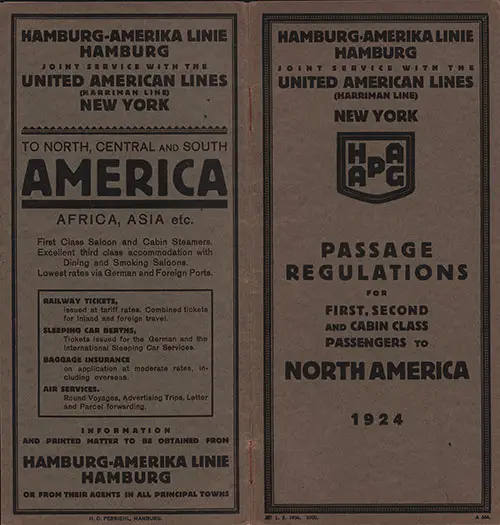
Cover, Passage Regulations for First, Second, and Cabin Class Passengers to North America, 1924. | GGA Image ID # 1a0319b2a5
🚢 Review & Educational Summary of Passenger Ships & Passage Regulations – 1924
📘 Historical Snapshot with Multidisciplinary Value
This 1924 brochure, issued jointly by the Hamburg-Amerika Linie and United American Lines (Harriman Line), is not just a passenger guide—it's a microcosm of interwar ocean travel, migration logistics, and geopolitical policy. It bridges maritime engineering, social stratification aboard ships, U.S. immigration law, and German economic recovery post-WWI.
The document is especially valuable for:
🧑🏫 Teachers creating lessons on immigration, maritime history, or 1920s geopolitics.
🎓 Students writing essays on the lived experiences of transatlantic migrants or analyzing Prohibition’s global impacts.
📜 Genealogists tracing ancestors who traveled via Hamburg, Cherbourg, or Southampton.
📚 Historians studying international trade, German shipbuilding recovery, and the American immigration regime during the Prohibition era.
A richly detailed 1924 brochure from Hamburg-Amerika Linie and United American Lines outlines transatlantic steamship routes, accommodations, fares, and Prohibition rules aboard vessels like SS Albert Ballin, Deutschland, and Hansa. From elegant first-class staterooms to democratized third-class layouts, this document is an essential artifact for understanding ocean travel logistics, immigration processing, and post-WWI shipping industry recovery. Ideal for educators, genealogists, and students of maritime and social history.
Issued 1. 2. 1924
CONTENTS
Steamers of the Hamburg-NewYork Service
New York Service
- General Regulations
First Cabin Fares (Not Digitized)
- S. S. "Albert Bailin"
- S. S. "Deutschland"
- S. S. "Resolute"
- S. S. "Reliance"
Second Cabin Fares (Not Digitized)
- S. S. "Albert Ballin" and "Deutschland"
- S. S."Resolute" and S. S."Reliance"
Cabin Class Fares (Not Digitized)
- S. S. "Hansa"
- S. S. "Cleveland"
- S. S."Thuringia" and S. S. "Westphalia"
- S. S. "Mount Clay"
General Information
- Baggage
- Arrival of Passengers at Port of Embarkation
- Short Sea Trips
- Hamburg-England, Hamburg-France
- Agencies of the Hamburg-Amerika Linie
THE HAMBURG-AMERIKA LINIE and THE UNITED AMERICAN LINES (HARRIMAN LINE) jointly maintain a Regular Passenger Service between HAMBURG AND NEW YORK by the following steamers :
- "ALBERT BALLIN" about 21,000 tons
- "DEUTSCHLAND" 21,000 tons
- "RESOLUTE" 20,000 tons
- "RELIANCE" 20,000 tons
- "CLEVELAND" 17,000 tons
- "HANSA" 16,400 tons
- "THURINGIA" 11,600 tons
- "WESTPHALIA" 11,600 tons
- "MOUNT CLAY" 8,200 tons
(All these vessels are of German construction)
Steamships SS Albert Ballin and Deutschland
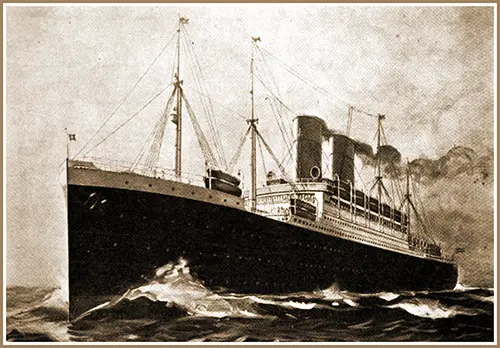
Hamburg-American Liner S. S. Albert Ballin Was Launched in Hamburg on 16 December 1922, at 22,000 Gross Tons. The Marine Journal, 23 December 1922. | GGA Image ID # 1bdbf9cd32
Built by the well-known firm of Messrs. Blohm & Voss of Hamburg, the new Twin-Screw Oil-Burning S. S. "Albert Ballin" together with her sister ship "Deutschland" are the largest vessels plying between Hamburg and New York. These steamers are each of 21 000 gross registered tons, have a length of 600 feet, with a width of 75 feet, and their two turbines indicating 13 000 horsepower will give them a speed of 15 1/2 knots.
They embody all the latest technical developments and improvements in German marine architecture and engineering, besides every modern invention that makes for safe navigation.
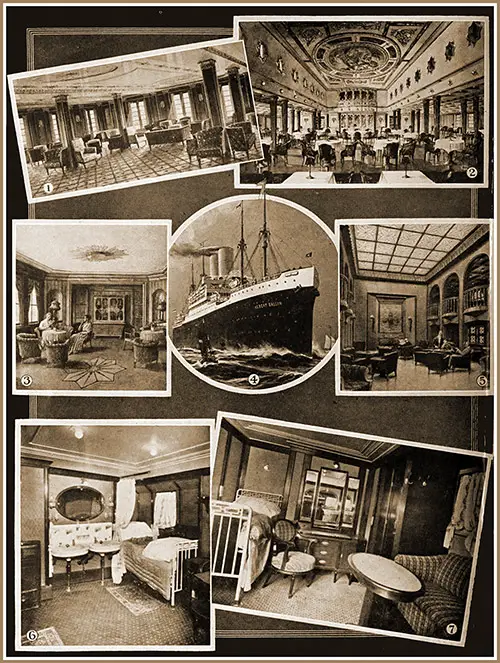
SS Albert Ballin: (1) Social Hall, (2) Dining Room, (3) Ladies' Lounge, (4) The Vessel in Service, (5) Smoking (6) and (7) First Class Staterooms. Marine Engineering and Shipping Age, August 1923. | GGA Image ID # 1bdc2b34cb
First Class Accommodations
The passenger rooms on the S. S. "Albert Ballin" and "Deutschland" are arranged and lavishly equipped as was usual in pre-war days. Luxuriously fitted Suites, Cabins-de-Luxe with private bath and spacious staterooms, affords accommodation for about 180 passengers in the first class, huge public rooms (Dining Saloon, Grill Room, Social Hall, Writing Room, Smoking Room, etc.) afford passengers all the comforts and conveniences of a first-class modern hotel.
An Electric Light Bath, Gymnasium, Swimming Bath, and an Elevator add to the amenities of life on board. A children's playground gives the little ones ample room for games and amusement. A shop is also available to purchase books and other literature, fancy goods, smoker's sundries, flowers, etc.
Second Class Accommodations
The second class is superior, and the 400 passengers have at their disposal cabins of large dimensions, besides the same lavish range of public rooms as is provided in the first class, except that there is no Grill Room. A unique feature is the provision of small tables in the spacious dining saloon, thus affording parties maximum comfort.
Third Class Accommodations
The third class accommodation is of the most modern description, including Dining Room, Smoking Room, Writing Room, and Hall. Of the 935 passengers carried in this class, 649 are accommodated in small cabins containing 2, 3, 4, or 6 berths, the remaining 286 third class passengers being placed in rooms with 10 or 12 berths.
Steamships SS Resolute and Reliance
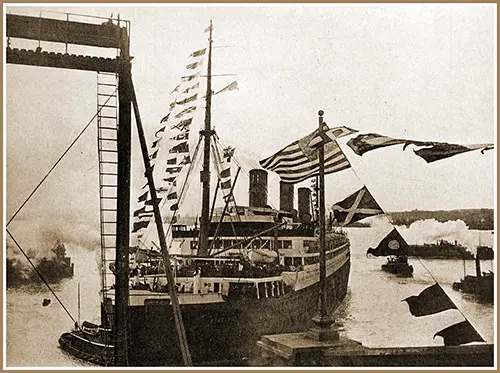
United American Line's New Steamship Resolute Is One of the Finest Ships Afloat, Leaving on a World Tour under the Registry of the Panama Government. Just Recently, UAL Replaced the American Flag with the Panama Flag to Enable the Ship to Make the World's Tour without Infringing on America's Dry Law (Prohibition). (Marine Engineering and Shipping Age, February 1923) | GGA Image ID # 232b1dad64
The large Triple -Screw Oil-Burning Steamers "Resolute" and "Reliance" were purchased by the United American Lines at the beginning of 1922. They each have a length of 616 feet, a breadth of 72 feet, a depth of 52 feet, and their average speed is 16 1/2 knots.
These steamers, sister ships, were built in Germany and completed and put into service in 1920. From a technical point of view and from that of passenger accommodation and comfort, these two luxurious steamers are veritable triumphs of the shipbuilder's art.
Accommodation is provided on each steamer for about 290 First Cabin, 320 Second Cabin, and 400 Third Class Passengers.
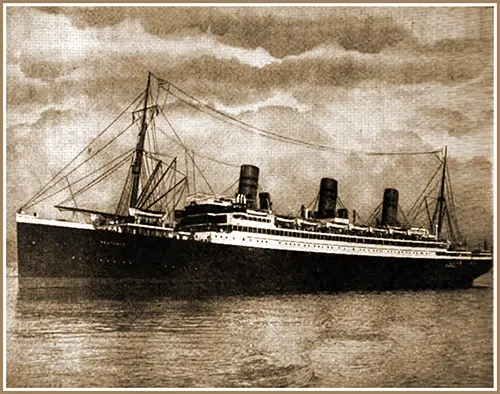
The United American Liner Reliance, Sister Ship to the Resolute. The Marine Journal, 9 December 1922. | GGA Image ID # 1bdcb29914
First Class Accommodations
The passenger accommodation is of the most commodious and luxurious description. Each vessel has six Suites of Rooms, comprising a sitting room, bedroom, private bath and toilet, 16 Cabinsde-Luxe with private bath, and about 46 Single Bedded rooms. All first cabin staterooms have bedsteads without any upper berths and are provided with running water. The passages are arranged to permit most inside rooms to receive direct daylight and ventilation.
The Dining Saloons are undoubtedly among the most striking and handsome to be found on almost any Atlantic Line, being particularly lofty and fitted with tables to seat two, four, or six persons each.
The roomy Promenade Decks with windscreens, Swimming Bath on the top deck with Dressing Rooms, Winter Garden and Ball Room, Smoking Room, Ladies Saloon, Writing Room and Library, Electric Light Baths, Childrens' Room, Gymnasium, and Passenger Elevators were all features of the two ships.
Second Class Accommodations
The Second Class accommodation is furnished tastefully and in good style. Cabins contain two, three, or four beds each, respectively, and among the general rooms, special mention should be made of the Dining, Smoking, Ladies', and Social Rooms.
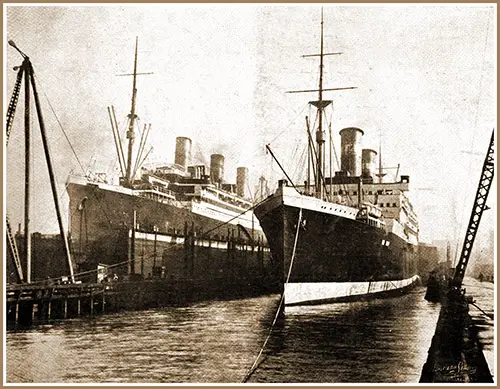
The United American Liner "Reliance" on No. 2 Dock to the Left. To the Right, the Italian Liner "Conte Rosso" Entering No. 1 Dock of the Morse Dry Dock & Repair Company. The Marine Journal, 16 December 1922. | GGA Image ID # 1bdcc06274
Classes of Passengers carried by the Steamships of the Joint Service
Whereas the S. S. "Albert Ballin," "Deutschland," "Resolute," and "Reliance" carry both first and second cabin passengers, the steamers "Hansa," "Cleveland," "Thuringia," "Westphalia," and "Mount Clay" are of the one class "Cabin" type.
Steamship SS Hansa (ex- Deutschland and Victoria Luise)
The S. S. Hansa was formerly known as the express steamer "Deutschland." Her length is 661 ft., breadth 67 ft., and depth 40 ft. In 1900, she gained the "blue riband" of the Atlantic for a record passage of 5 days 71/2 hours.
In 1912 the steamer was reconstructed, and less powerful engines were installed. Under the name of S. S. "Victoria Luise," she was then employed for pleasure cruises. After the war, the vessel underwent a complete reconstruction and is again running in the New York service as the S. S. "Hansa." The ship now has a speed of about 16 knots, accommodates 220 "Cabin-Class" and 664 Third Class passengers, and fully meets all comfort and general service requirements.
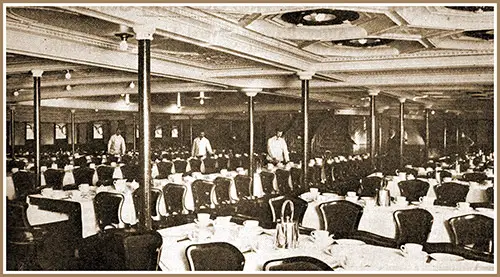
Here is the dining room for third-class travelers on the S. S. Hansa, the first German passenger liner to steam into New York Harbor since the World War. The accommodations are better than what millionaires enjoyed a few years ago. The Marine Journal, 3 December 1921. | GGA Image ID # 1bdbab6073
SO RAPID has been the recent progress of steamship companies in caring for third-class passengers that those who travel third class these days fare as well as did the first-cabin travelers of but a few years ago. This is strikingly exemplified by the S. S. Hansa, which recently came into New York harbor.
She was the first German passenger steamer to enter New York's port since the outbreak of the World War. She is in the Hamburg-American Line, the American agents of which are the United American Lines. Her passenger accommodations immediately attracted the attention of shipping men in general.
When known as the Deutschland, the Hansa was formerly the blue ribbon liner of the North Atlantic. For three years, she held the record for speedy passage, with a trip in five days seven and one-half hours, and she was one of the most luxurious passenger liners afloat at the time.
In 1912 this vessel was somewhat remodeled, her speed reduced to 17# knots, and under the name of Victoria Luise, she was commissioned as a pleasure cruiser. She served in this way until the war necessitated her lay-up.
In planning to return this vessel to service after the war, the Hamburg- American Line could not overlook the excellent demand for third-class passage and the inevitable popularity of the one-class steamer, or so-called "ship of democracy." Consequently, the Company decided to convert the Hansa into a ship of this type.
Except for cabins for about forty persons, all her former first- and second-class accommodations have been converted into rooms for two, four, six, and eight third-class passengers, of which there are now a total of 334. The dining salons, social rooms, and other appointments, formerly considered luxurious by first-class passengers, are now a part of the third-class accommodations.
The Hansa is a vessel of 16,500 tons gross, 663 feet in length, 67-foot beam, and has five decks. She is an oil-burner with a speed of 17 1/2 knots. Her crew totals 200 officers and men, and the total passenger accommodation is 2,000.
Captain Kier, who is now in command of the Hansa, was formerly commander of the Imperator, then the flagship of the Hamburg-American Line fleet.
First Class Accommodations
Passengers have a sizeable Dining Saloon, a Smoking Room, and a Ladies' Saloon at their disposal. Extensive Promenade Decks allow ample opportunity for exercise.
The very wide cabins are comfortably fitted and furnished and accommodate two or three passengers, but there is also a limited number of rooms for one person. The available equipment of the vessel includes all the latest safety appliances.
Steamship SS Cleveland
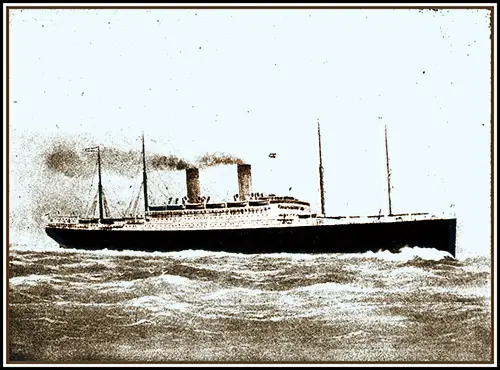
The SS Cleveland of the United American Lines. The Marine Journal, 14 July 1923. | GGA Image ID # 1bdcd46515
The United American Lines have recently purchased the fine Twin-Screw S. S. "Cleveland" of about 17 000 tons, formerly owned by the Hamburg-Amerika Linie, which was very favorably known in the North Atlantic Service, and also used for Cruises "Around the World." Before being placed in the Joint Service between Hamburg, Southampton, Cherbourg, and New York as a "Cabin-Class" steamer, this vessel was thoroughly re-conditioned and re-constructed as an Oil-Burning steamer under her original name of "Cleveland."
Accommodation is provided for about 600 "Cabin-Class" passengers. In addition to the space previously allocated to second class passengers, the total capacity hitherto used for first-class passengers, including many suites and rooms with private baths, besides numerous single-berth rooms, is now allocated to the "Cabin-Class."
Cabin Class Accommodations
In addition to the excellent stateroom accommodation, Cabin-Class passengers have unusual promenade deck space, the forward portion of the main promenade deck being sheltered from wind and weather by large glass windows, elegantly appointed public rooms, including two spacious dining saloons (with small tables), two social halls, two smoking rooms, as well as library and reading rooms.
There is also a passenger elevator and a darkroom for photography.
The steamer is equipped with every modern safety device.
Third Class Accommodations
The third-class accommodation and service are of the same high standard as the other steamers maintain. No less than 598 passengers are berthed in rooms containing 2, 4, or 6 persons each, and there is also accommodation for a further 400 passengers in open accommodation. The public rooms include a social hall, dining room, smoke room, ladies' saloon, etc.
Steamships SS Thuringia (1922) and SS Westphalia (1923)
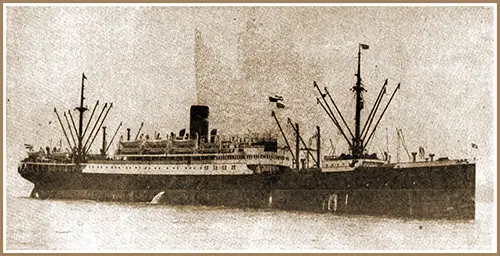
Atlantic Ferry 1923 -- Hamburg-American Liner "Thuringia." American Shipping, April 1923. | GGA Image ID # 1bdd0297f9
The two new sister ships, "Thuringia" and "Westphalia," which were constructed in German yards, conform to the highest class of the Germanischer Lloyd. They are each of 11,600 tons register, have a length of about 475 feet, a breadth of 60 feet, and their design ensures the greatest degree of stability at sea.
Each vessel has accommodation for 150 Cabin Class and about 590 Third Class passengers. Exceptional comfort is provided for Cabin Class passengers in the large, roomy, and tastefully furnished staterooms, many for one passenger only. The other rooms are arranged for either two or three passengers.
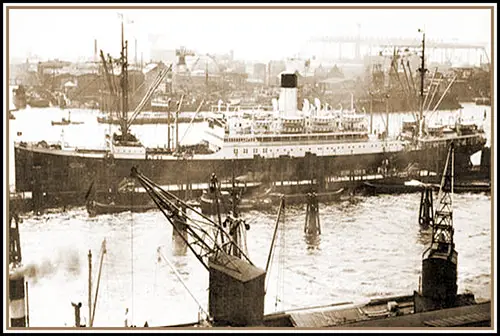
The SS Westphalia of the Hamburg-American Line (1923) at the Port of Bremen circa 1934. | GGA Image ID # 1bdd08df8e
The third class accommodation is of the most modern description. Many rooms are fitted with beds instead of the usual berths and running water in the washbasins. The dining room with small tables, large public spaces, a glass-enclosed promenade deck, etc., provides all that one can ask for to ensure comfort during the voyage.
Steamship SS Mount Clay (ex - Prinz Eitel Friedrich)
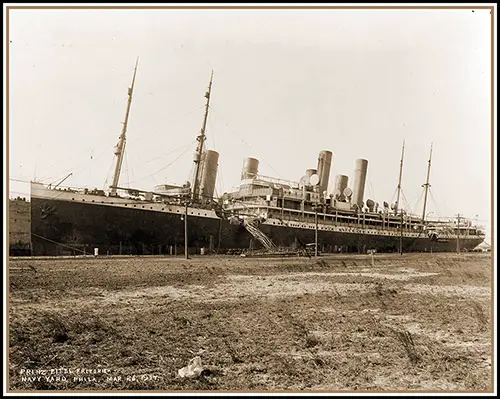
The SS Mount Clay as the Former German Passenger Liner Prinz Eitel Friedrich at the Philadelphia Navy Yard, 28 March 1917. Interned at the Philadelphia Navy Yard, Pennsylvania, on 28 March 1917. Behind her is the liner Kronprinz Wilhelm. These ships were seized when the United States entered World War I and subsequently served as USS DeKalb and Von Steuben. Naval History and Heritage Command Image No. NH54659. | GGA Image ID # 1bdd0ba4d6
The S. S. "Mount Clay" of the United American Lines, formerly the German S. S. "Prinz Eitel Friedrich," is a fine modern twin-screw steamer of 8,200 tons and has been specially adapted for the conveyance of about 99 "Cabin Class" and 1006 Third Class passengers. The Cabin Class passengers have at their disposal a separate Promenade Deck situated amidships, Dining Saloon, Social Hall, and Smoking Room. The Third Class passengers are also provided with several social rooms, and the equipment includes numerous bathrooms with hot and cold seawater.
NEW YORK SERVICE
GENERAL REGULATIONS
The Fares for first and second cabin passengers by the steamer: "Albert Bailin," "Deutschland'," "Resolute," and "Reliance," at well as those for the Cabin Class of the steamers "Hansa," "Cleveland," "Thuringia,'" "Westphalia" and "Mount Clay" are per berth in rooms containing two, three or four berths, as shown on the cabin plan of the particular steamer.
Besides these rooms in the first cabin of the steamers "Albert Ballin," "Deutschland," "Resolute," and "Reliance" and in the Cabin Class of the steamers "Hansa," "Cleveland," "Thuringia," and "Westphalia" several single berth rooms have been provided.
Passengers traveling either second class or Cabin Class (but not first-class) whose final destination is Boston, Mass., or Philadelphia, Pa., will be furnished with a free railroad ticket from New York to these points, provided application is made at the time of booking.
CHILDREN
From 1 to 10 years of age are charged half-fare when two children occupy a berth. For infants under one year (limited to one per family), the following fares are payable:
CHILDREN'S FARES:
First Cabin Winter Fare Summer 1- are From Hamburg, Southampton, or Cherbourg $ 16.50 18.50
Second Cabin and Cabin Class Valid all the year-round From Hamburg, Southampton, or Cherbourg $ 11.—
For every additional infant under one year, half-fare is payable.
SEASONS
The fares shown are in effect both for the voyage to and from New York; but in the first cabin of the steamers "Albert Ballin," "Deutschland," "Resolute," and "Reliance," the rates vary according to the summer and winter seasons, which are as follows:
FROM EUROPE: Winter Fares from Nov. 1st to June 30th ( Westbound) Summer Fares from July 1st to Oct. 3Ist
FROM AMERICA: Winter Fares from Aug. 1st to March 31st (Eastbound) Summer Fares from April 1st to July 31st
The fares for second class and cabin-class are the same all the year round for all steamers.
ROUTES
On the Westbound voyage to New York, the steamers "Albert Ballin'', "Deutschland," "Resolute," "Reliance," and "Cleveland" call at Southampton and Cherbourg; on the Eastbound voyage, these steamers call at Cherbourg and Southampton en route fo Hamburg.
The steamers "Hansa," "Thuringia'', "Westphalia," and "Mount Clay" sail directly between Hamburg and New York.
SERVANTS
In the first cabin of the steamers "Albert Ballin," "Deutschland," "Resolute" and "Reliance," the following fares for servants are charged:
Winter Fare Summer Fare From Hamburg, Southampton, or Cherbourg $ 150.— $ 165.
They are either accommodated in special quarters or are allotted berths in the second cabin with access to the first cabin for waiting purposes. No reduction of the fare for servants is made in the Cabin Class of the steamers "Hansa," "Cleveland," "Thuringia," "Westphalia," and "Mount Clay."
RETURN TICKETS
These tickets, which are available for one year, are issued at the combined outward and homeward fares according to season, without any reduction. Differences in fares occasioned by season will be collected or refunded accordingly. Passengers must pay the fare for the return portion of the voyage before the commencement of the outward journey.
Passengers are requested to note that when traveling from New York to Europe, the U. S. War Tax of $ 5— is payable per passenger over one year of age and $ 1.— for each child below that age.
BOARD and PROHIBITION
The fares include full board, except for Wine, Spirits, Beer, and Mineral Waters.
In consequence of the American Prohibition Laws, alcoholic drinks can only be obtained on the Westbound voyage to New York on the steamers of the Hamburg-Amerika Linie and United American Lines up to the three-mile limit. Eastbound from New York, alcoholic drinks will only be available should the regulations of the American Government so allow it.
SELECTION OF BERTHS
During the traveling season, the berths, as a rule, are all taken long before the sailing date. It is therefore advisable to secure accommodation as early as possible. The earlier berths are ordered, the greater the number of available rooms from which passengers may select. On payment of expenses, our Agents will ascertain by telegraph whether the berths wanted by passengers are still vacant.
The above applies to passengers who have yet to procure their tickets and holders of passage orders purchased in America.
In the latter case, the passenger should enclose the order with the application for passage.
BOOKING
Passengers must pay the full passage money or deposit at least one-third of the fare to secure their passage. Payment may be made to the Company's Agents or Representatives or remitted directly to the Hamburg-Amerika Linie, 25, Alsterdamm, Hamburg. Without your fare payment, no berth will be reserved. When ordering berths, one should state whether they are intended for the use of ladies, gentlemen, or married couples.
PAYMENT OF BALANCES
Passengers are at liberty to remit the balance of the passage money at any time, but at Hamburg, such payment must be made not later than three days before sailing, and during business hours, between 9 a. m. and 5.30 p. m. If the total cost for passage money is not completed three days before sailing, berths will be disposed of to other applicants.
PAYMENT OF PASSAGE MONEY
As the fares from Europe to New York are charged in Dollars, payments have to be made in American paper money or bank cheques in New York. These will be converted into dollars at the official rate to reach our Hamburg Offices. Passengers can effect payment through such other currencies as Sterling, Dutch Guilders, Swiss Francs, etc.
RETURN TICKETS
Passengers in possession of Return Tickets, booked for a specified steamer for a fixed sailing date and desirous of transferring to another steamer, can only do so if an application is made at least 28 days before the steamer's departure which the passenger initially intended to sail. Such transfer can only occur if accommodation is available on the selected steamer.
AVAILABILITY OF DEPOSIT RECEIPTS AND PASSAGE CONTRACTS
All tickets are personal and are not transferable except by permission of the Company.
PASSENGERS NOT SAILING
If a passenger is booking a berth and not proceeding, the amount paid up to one-half of the passage amount is forfeited.
In cases, however, where sufficient notice is given to enable the Company to otherwise dispose of the accommodation, the deposit paid will be transferred to a later sailing within one year, against payment of any fare increase.
Passengers not sailing without informing the Company forfeit one-half of the passage money.
CONVEYANCE OF CHILDREN
Children under 16 years cannot be taken, unless aocompanied by adults.
AMERICAN HEAD TAX
In addition to the Ocean Fare, every passenger proceeding to the United States has to pay before departure the Head Tax of $ 8 as prescribed by the American Government, with the following exceptions:
- American Citizens who have a valid American Passport
- Children under 16 years of age are born outside of the United States, accompanied by their father or mother.
- Persons born in the United States, regardless of age or nationality, but such passengers must produce their Birth (not Baptismal) Certificate; otherwise, the passenger must pay the Tax.
- Diplomatic and consular officers and other accredited officials of foreign governments, their suites, families, and guests for whatsoever purpose they visit the United States
Women born outside of the United States, married to U. S. Citizens after September 21st, 1922, are required to pay the Tax.
RECOVERY OF HEAD TAX
Passengers proceeding to the United States either for business or pleasure, who intend to leave again within sixty days of their arrival, can obtain a refund of the tax, providing:
- At the time of booking, they state in Column No. 20 on the U. S. Declaration Form for non-Americans that they intend to return within 59 days.
- On arrival in New York, they inform the Immigration Inspector and request from him a "Transit Certificate" Form No. 514.
This Transit Certificate is only valid when the duration of the stay in the United States does not exceed 59 days. The certificate must be duly completed by the Purser of the steamer by which the passenger leaves the United States and must be endorsed with the name of the steamer and date of sailing and be countersigned. Passengers proceeding by railroad to destinations over the United States border must hand the certificate to the train conductor to complete it by U. S. Customs Officer at the border station.
The Transit Certificate must be sent within 120 days after the date of arrival in New York, through the medium of the Steamship Co. by which the passenger proceeded to the United States, to the Immigration Department at Washington.
Refund of the Head Tax can only be made when these conditions have been complied with.
The return of the Head Tax can also be obtained by the surrender of the Transit Certificate at the Offices of the United American Lines in New York before embarkation or during the return voyage through the Purser on board.
MONEY REGULATIONS
Every passenger over ten years of age must, on landing in the United States of America, be in possession of at least $ 25.—; children from 1-10 years must be able to produce half that amount. In addition, passengers wishing to proceed from New York to the country's interior must possess the means for their sojourn in New York and the railway fare to their destination. The American authorities pay special attention to the strict fulfillment of these regulations. Passengers who do not have the sum above-mentioned are not allowed to land in the United States.
According to German Law, passengers are only allowed to take a limited sum of money out of the country, insufficient for the voyage to America. Therefore, all passengers must apply to the Finanzamt established for an Export Licence (Ausfuhrbewilligung) to enable them to take out of Germany a sum above the regulation amount for their journey.
IDENTIFICATION PAPERS
Before a passenger can reserve accommodation, all passengers must have their identification papers in order.
a) Non-German subjects resident outside of Germany must obtain a passport or traveling permit from the government of their own country, which must be visaed as follows:
- By the nearest United States Consular Officer residing in their native Country.
- By the Consul of each country, they pass on their way to Hamburg.
- By the German Consul.
The visa of the German Consul to passengers coming from non-German countries must contain not only the permit to enter Germany but also the permit for leaving Germany, being valid until the sailing day of the steamer.
The visa of the American Consul will be granted on presentation of a passport made out by the home authorities of the passenger and of an affidavit, by which American relations or friends of the passengers pledge themselves to support them so that they are not thrown upon the community or any parish of the United States of America. The visa cannot be procured by letter, but one must personally apply to the American Consul.
b) German subjects resident in Germany must apply for a German passport, and their home authority must endorse such passport to the effect that it is valid for leaving Hamburg for New York until the sailing day of the steamer or, if possible, a week later. The American Consulate must visa this passport nearest to their residence in Germany. American Consulates, called "United States Consular Offices," exist in Berlin, Hamburg, Bremen, Breslau, Dresden, and Frankfort o. M., Coblence, Cologne, Konigsberg, Leipzig, Munich, Stettin, and Stuttgart.
Passengers must apply personally to the American Consul nearest to the district where they have resided for the longest period during the previous twelve months. They must produce the following papers: — Passport, birth certificate (if married, also a marriage contract or a certified copy of it), medical certificate of health, police character, and three photographs, as well as the affidavit of their American relations or friends, or letters or documents of American Citizens, in which, as in the affidavit, the reason of the voyage of the applicants is stated. The writer's nationality of such letters or documents must be duly certified.
c) In Austria and Hungary, the passports will be visaed by the proper American authorities; applicants, therefore, must apply to these authorities in Vienna (3, Stock im Eisen) or Budapest, furnishing at the same time the afore-mentioned papers.
d) American Citizens returning to the United States of America must have a valid passport endorsed like those of all other passengers by German and non-German authorities for passing through or leaving the various countries. If the visas have expired, passengers are requested to have them renewed in good time.
e) Aliens resident in the United States who have not already secured the American permit for entering the United States nor the German one entitling them to leave Germany have to obtain these visas from the competent United States Consulate or the German Passport Department, respectively, before their departure for the United States.
THROUGH-TICKETS
Through-tickets are issued via New York to all stations in the United States of America and Canada at current fares. Through-tickets at special reduced rates are issued via San Francisco to Japan, China, and Australia.
STEAMER TOURS ROUND THE WORLD
Tickets are obtainable at moderate rates. Detailed information will be supplied by the Hamburg-Amerika Linie or any of its Agencies.
TABLE SEATS
The Chief Steward of the steamer will assign table seats immediately after departure.
Children for whom only half-fare has been paid are not entitled to seats in the main dining saloon when meals are served at fixed hours; but if no children's room is available, they are required to take their meals in the main dining saloon either before or after those of the adults.
STEAMER CHAIRS AND TRAVELING RUGS
Passengers may hire comfortable chairs for use on deck during the voyage at a charge of $ 1.50 per chair. Passengers may have good woolen rugs at the same rate. One must make an application regarding these to the Deck Steward.
PHYSICIAN
An experienced physician is attached to every steamer. No charge is made for medical attendance in cases of sickness contracted on board; medicines are also provided complimentary. However, the ship's physician can ask for the usual fees from travelers who submit for treatment of disorders not contracted during the voyage.
BARBER
The ship's barber is entitled to make a charge for his services.
PASSENGERS' MAIL
The address must contain the steamers' name, direction, and the class by which the passenger is traveling to ensure the prompt delivery of letters, postcards, newspapers, etc., that are sent to our Offices for passengers.
Thus a letter sent to Hamburg, for instance, should be addressed as follows:
JOHN SMITH, Esq.
First Cabin passenger by S. S. "Albert Ballin"
leaving for New York on July 5th
c/o HAMBURG-AMERIKA LINIE,
Kajütten-Abteilung,
Alsterdamm, HAMBURG.
Mail sent to Southampton, Cherbourg or New York should also bear the name and address of the Company's Agents or Offices at these ports, viz.:
Southampton: Wainwright Bros. & Co., 10, Orchard Tel. Addr.: Place "Outspeed"
Cherbourg: Agence Transatlantique, 46, Rue de Tel.Addr.: "Unamlinu"
New York: United American Lines, 39, Broadway "Unamlines" It is advisable to post mail intended for passengers well in advance, and to write the name and address of the sender on the outside of the envelope or wrapper.
The Company gladly undertakes the transmission or delivery of telegrams, letters, etc., intended for its passengers, but, owing to the immense number of such despatches forwarded to its care, it must decline all responsibility if they should inadvertently be delayed or lost.
BAGGAGE REGULATIONS
BAGGAGE CARRIED FREE
The Company carries free of charge on the steamer for each First, Second, or Cabin-Class passenger paying full fare, 100 kilos weight or 20 cubic feet measurement of personal baggage, besides hand baggage: and for each child paying half fare one half these quantities. Excess baggage will be charged at the following rates:
- From Hamburg: $ 3.25 per 100 kilos.
- From Southampton: 2s 6d per cubic foot or 2d per lb.
- From Cherbourg: Fcs. 0.45 per kilo.
- Between German, English and French Ports: $ 2 per 100 kilos.
THE PACKING OF BAGGAGE
Passengers must pack in all baggage securely fastened trunks, boxes, travel bags, or the like, and suitable for carriage by sea. The Owner's full name must be firmly secured to each piece of baggage; the best plan is to paint the name on trunks or other packages.
CONTENTS
Passengers' baggage should only contain articles for personal use, such as wearing apparel, etc. The Company will not undertake the carriage of household effects, furniture, etc., as baggage.
Merchandise, money, securities, jewelry, or other valuable or dutiable articles and documents should not be placed in baggage, and the Company declines all responsibility concerning such articles.
Passengers disregarding this regulation make themselves answerable for any consequences that may ensue. However, valuables in sealed packages with the owner's name plainly written thereon may be given to the Purser for safe-keeping during the voyage, but without guarantee of the Company.
No one can bring steamer wine, beer, spirits, etc.; one can purchase them on board at fixed prices. It is strictly forbidden by law to ship explosives, combustibles, or any goods whatsoever of a dangerous character, either as passengers' baggage or as merchandise, upon any of the Company's steamers. Anyone infringing these regulations will be liable to prosecution and held responsible for all damages sustained in consequence of such shipment. Weapons and ammunition must be delivered to the Captain for safe custody during the voyage.
RESPONSIBILITY OF THE COMPANY
The conveyance of passengers' baggage is under the stipulations on the passage contract ticket. The Company will not, under any circumstances, assume responsibility for loss or damage to baggage while in its custody beyond the following amounts:
- For the baggage of each first class passenger paying full fare $ 100.
- For the baggage of each second cabin or oabin class passenger paying full fare $ 50. (Children in proportion to the fare paid).
Passengers wishing to cover themselves for an amount higher than the sums mentioned above are strongly recommended to take out an insurance policy. The Company accepts no responsibility for hand baggage, and other effects passengers have in their care during the voyage.
THE STOWAGE OF BAGGAGE
All large pieces of baggage (hold baggage) are stowed in the luggage holds. Access to which is possible during the voyage at certain hours daily. In addition to small hand baggage, passengers may keep trunks of moderate size (cabin baggage) under the sofas and berths of the cabins. The space under the sofas is generally 32 cm (14 inches) in height. Passengers are kindly requested to fasten to each separate piece of baggage a hold or cabin-baggage label so that we may carry out their wishes on board as nearly as possible. One may obtain the necessary labels from all agents of the Company.
HAND BAGGAGE
In their interest, passengers are specially requested to keep their hand baggage with them, both onboarding and when leaving the steamer.
CONVEYANCE OF ANIMALS, BICYCLES etc.
We can only accept animals on board against the presentation of a ticket issued by the respective Company. Dogs will only be transported when they are sent on board in a cage and provided with a chain and a muzzle, which the owner must supply.
For Sheepdogs shipped from Hamburg, a special export license is necessary, which may be obtained from the Reichskommissariat für Ein- und Ausfuhrbewilligung, Lietzenburger Str. 18, Berlin W, without which we can effect no shipment. The number of dogs is limited to three per passenger. Taking dogs or cats into the cabins or on the decks set apart for passengers is not permitted.
The various Freight rates are as follows:
- Per dog, including food and attendance .. . S 20.—
- For Birds (in Small numbers) per Cage .. S 5.
- Other animals will only be taken by special agreement at the usual freight rates. The Companies decline all responsibility for live animals.
Bicycles and Motor Cycles must be packed, the charges being as follows:
TO NORTH AMERICA:
- Bicycles ... . $ 5.
- Motor Cycles (without Side-Car) ... $ 25.
- Motor Cycles (with Side-Car) $ 35.
- Perambulators ... $ 5.—
Motor Cars must be packed and previous arrangements made for shipment against payment of freight rate.
Prinz Eitel Friedrich:
- Motor Cycles (without Side-Car) .. S 15.—
BAGGAGE SENT IN ADVANCE TO HAMBURG
All baggage sent abroad from Germany is subject to inspection by the German Customs Authorities to trace articles exempt from exportation. Passengers in Germany should present their luggage for examination to the Customs Office nearest their residence; it will then be examined, tied up, and sealed. A certificate of inspection will be handed to the passenger. One should pay particular attention to seeing that lead seals are affixed to the luggage, as the certificate alone is not regarded as proof that an examination has taken place.
To examine luggage of larger size (household furniture), the Customs Offices are, as a rule, prepared to send an officer to the applicant's home. The Customs examination of baggage can also be made in Hamburg, but it would involve far more loss of time, more significant expense, and trouble to the passenger than done at home. The unpacking and repacking can scarcely be done so carefully in Hamburg as in the passenger's home. Baggage from abroad, being transported through Germany for shipment, is sealed immediately by the Customs Office on entering Germany and will not be examined in Germany.
BAGGAGE FORWARDED IN ADVANCE
Passengers who prefer not to bring their baggage may send it to Hamburg in advance by grande or petite Vitesse. Such luggage should arrive not later than three days before the steamer leaves Hamburg and should be addressed as follows:
An die Gepäckannahme der Hamburg - Amerika Linie, Hamburg Baggage for (passenger's name)
- Travelling 1st Cabin
- 2nd „ by S. S. (name of steamer)
- Cabin
- Sailing on the (date)
- From Hamburg to (porti of destination)
All baggage thus sent to the Company in advance will be stored free of charge until the steamer's departure in question. The Customs declaration that the Customs Officer must duly attest should be sent to the Hamburg-Amerika Linie together with the advice regarding the dispatch.
BOOKING OF BAGGAGE IN HAMBURG
All baggage — except hand baggage — must be delivered to the Baggage Receiving Office of the Hamburg-Amerika Linie, where will be found the luggage sent in advance to the Baggage Department. Passengers must book baggage at the Baggage Receiving Office of the Company in good time before the steamer's departure. The Office hours are from 9:00 a. m. to 5:00 p. m.
The final passage tickets must be produced when baggage is booked and previously procured at the Hamburg-Amerika Linie, 25, Alsterdamm. After payment of any excess carriage and of the charges for transferring baggage that has been forwarded in advance from the Railway station to the Baggage Receiving Office of the Company, passengers receive their baggage receipts.
Passengers are kindly requested to see that their baggage has arrived and is booked personally. If they fail to do so, the Company will not guarantee due shipment. The same applies to the booking of baggage in Paris and London. When luggage is forwarded to Cherbourg and Southampton, one should send written instructions concerning it to the Company's agents at these ports.
BAGGAGE FORWARDED IN ADVANCE TO INTERMEDIATE PORTS
Passengers embarking at Southampton or Cherbourg are at liberty to send their baggage to the port at which embarkation takes place but to ensure such baggage is being promptly shipped, passengers are requested to send instructions by letter to the Port Agents in question. The free baggage allowance is only made for baggage actually shipped at the port of embarkation.
PARCEL POST PACKAGES
Parcels forwarded by Post should be addressed in the same way as other baggage sent in advance. The sender is requested to write on the counterfoil of the parcel dispatch note, customary on the Continent, the passenger's name and the name and date of departure of the steamer. The German Customs regulations are equally applicable to postal packages.
PASSENGERS PREVENTED FROM TRAVELING
Passengers who are prevented from sailing but who have already forwarded their baggage in advance are particularly requested not to omit to give the Baggage Receiving Office in question timely instruction concerning the disposal of their luggage. If on the day before sailing, such instructions should be provided by telegraph.
ON BOARD
During the voyage, passengers are kindly requested to refer all baggage matters to the Baggage Official on duty. No other member of the ship's Company is entitled to accept orders concerning baggage. Should, Nevertheless, one make any arrangements between passengers and stewards or other crew members, such are looked upon as purely private arrangements and are not binding on the Company.
ON LEAVING THE OCEAN STEAMER
On leaving the ocean steamer at the port of destination, passengers are strongly recommended to claim their baggage in person so that they may suffer no damage through luggage becoming lost or mislaid when landed in a baggage shed or Custom House. Passengers have to be present when their luggage is passed through the Customs. The Company declines all responsibility for baggage passengers do not claim immediately after landing.
BREAK OF VOYAGE
The general practice is to book baggage to the port named as the destination on the passenger's ticket. Passengers who change their plans and desire to break their voyage, wishing to have their baggage partly or wholly landed in a port other than that named on their baggage receipt, are requested to communicate with the baggage officer on duty concerning the landing of such baggage.
CLAIMS
Claims for damaged or missing baggage must be referred immediately to the baggage officer in charge on board; also, notification in writing must be sent to the Company's Agents directly upon their arrival at the port of destination; otherwise, no responsibility will attach to the Company, and investigation be made more difficult. The interpretation of all contracts relating to baggage and its transportation must be based on German Law.
BAGGAGE INSURANCE
Insurance of baggage against sea risk, etc., is recommended to passengers in their interest. For the convenience of passengers, the Port Offices of the Company have instructions to accept orders for insurance, if desired.
ARRIVAL OF PASSENGERS AT THE PORT OF EMBARKATION
HAMBURG
Offices of the Company: Hamburg-Amerika Linie, 25 Alsterdamm. (Office Hours: 9.0 a. m. to 5.30 p. m., Saturdays until 3.0 p. m.) Passengers on arrival at Hamburg must call the above Office to obtain their final steamer ticket etc. when the information is given concerning the hour of embarkation and the booking of their baggage.
a) For passengers coming from countries east and southeast of Germany, i.e., from Austria, Hungary, Czechoslovakia, Yugoslavia, Lithuania, Latvia, Esthonia, Poland, Roumania, and Bulgaria, it is necessary to arrive in Hamburg five days before the sailing date of the steamer to comply with the regulations of the American Government. This regulation also applies to United States citizens.
b) Passengers from Germany, Switzerland, Holland, Scandinavia, and America must call at the Hamburg Office of the Company not later than three days before sailing.
c) According to a regulation of the American Government, every passenger of the second cabin and cabin class has to submit himself to a medical inspection at the port of embarkation; this regulation also applies to American citizens.
SOUTHAMPTON
Passengers are requested to call well in advance at the Office of the London Agency: Messrs. Wm. H. Muller & Co. (London) Ltd., Greener House, 66 -- 68, Haymarket, London S. W. I, to obtain their final steamer tickets and to reserve seats on the train.
During the Summer Season, unless Hotel accommodation has been reserved in advance at Southampton, passengers are recommended to travel by steamer train.
Fares (payable by the passenger):
- London to Southampton 1 st Class 16 s 6d 3rd Class 9 s 11 d.
The speoial or connecting train usually leaves London (Waterloo Station) on the morning of sailing and runs direct alongside the Tender in Southampton Docks.
Passengers who proceed direct to Southampton must call upon the Port Agents:
Messrs. Wainwright Bros. & Co., 10, Orchard Place, Southampton, not later than one day before sailing to obtain their final steamer ticket and for information concerning the hour of embarkation.
CHERBOURG
Passengers are requested to call well in advance upon the Paris Agency:
Societe Anonyme d'Escales, 11 bis, Rue Scribe, Paris, to obtain their final steamer tickets, to reserve seats in the connecting train for Cherbourg and to complete the necessary formalities.
Fares (payable by the passenger):
Paris to Cherbourg 1 st Class Fres. 81.-2nd Class Frcs. 54.30 3rd Class Frcs. 35.25
Passengers who proceed direct to Cherbourg, must call upon the Port Agents:
Agence Transatlantique, 46, Rue de la Cayenne, Cherbourg to obtain their final steamer tickets, to complete the necessary formalities, and for information concerning the hour of embarkation.
N. B. In France, the passports of the passengers will be visaed by the French authorities for embarkation. The Company's agents, either at Paris or Cherbourg, will be pleased to advise passengers on procuring such a visa. Before embarkation at Cherbourg, the baggage will be examined by the Customs. The French authorities permit passengers to take with them an amount not exceeding Fr. 5000.— either in French or in foreign currency.
The information given under the heading of Hamburg also applies to passengers embarking at Southampton or Cherbourg.
SHORT SEA TRIPS TO ENGLAND AND FRANCE
Opportunity is afforded to passengers to travel by the large and luxurious New York steamers to and from England and France and enjoy all the advantages offered on an Atlantic voyage.
From Hamburg, the steamers "Albert Ballin," "Deutschland," "Resolute," "Reliance," and "Cleveland" call at Southampton and Cherbourg: also at these Ports in the reverse direction Eastbound from New York.
The exact dates are published in the sailing list of the New York Service.
APPROXIMATE DURATION OF PASSAGE
- From Cuxhaven to Southampton about 28 hours,
- from Cuxhaven to Cherbourg about 34 hours.
FARES
Hamburg to Southampton or vice versa : 1st Cabin $28; 2nd Cabin $20
Hamburg to Cherbourg or vice versa : 1st Cabin $28; 2nd Cabin $20
Southampton to Cherbourg or vice versa : 1st Cabin $12; 2nd Cabin $8
Return tickets are issued at the combined outward and homeward fare, but without any reduction.
Children from I to 10 years are charged half fare.
The fares include full board on the steamer, exclusive of wine, beer, spirits and mineral waters.
PASSPORTS
Passengers for England or France must have a valid passport bearing the Visa of the respective country and the German Visa.
🏆 Most Engaging Section: The SS Hansa as a "Ship of Democracy"
The brochure’s most fascinating section is the profile on the SS Hansa, formerly Deutschland, which once held the Blue Riband for the fastest transatlantic crossing. After WWI, it was repurposed into a “Cabin-Class” vessel—emblematic of a democratizing travel experience. Remarkably, its third-class accommodations were said to rival the luxury of pre-war first-class.
🟨 What Makes This Compelling?
It reflects class evolution on passenger ships.
Ties to postwar reparations and economic strategy.
Highlights how luxury was repackaged for mass migration.
“So rapid has been the recent progress of steamship companies in caring for third-class passengers that those who travel third class these days fare as well as did the first-cabin travelers of but a few years ago.”
Perfect for a research paper on evolving class structures in transport!
🖼️ Noteworthy Historical Images
🖼️ Image Caption and ✨ Why It's Noteworthy
Cover, Passage Regulations for First, Second, and Cabin Class Passengers to North America, 1924 | The design evokes post-WWI orderliness and transatlantic confidence.
SS Albert Ballin: Social Hall, Dining Room, Lounge, etc. | An architectural and sociocultural window into German design luxury.
SS Hansa: Third-Class Dining Room | Visual evidence of class improvements—ideal for comparative studies.
United American Line’s SS Resolute under Panama registry | Illustrates flag-switching to evade Prohibition—a unique legal workaround.
SS Mount Clay (ex-Prinz Eitel Friedrich) | Connects naval wartime history with postwar repurposing for migration.
🔤 OCR Limitations Noted
Since this content was digitized using OCR, it likely contains:
- Misread characters (e.g., l vs 1, or „ instead of quotation marks).
- Minor spacing inconsistencies (S. S. may appear as S. S. or S. S).
- German diacritics may be improperly rendered or omitted.
- Period typos in financials (17# knots instead of 17½ knots).
Teachers and students should verify key data points (tonnage, fare rates, names) against the image scans if writing citations or reports.
🏷 Keyword & Tag Suggestions:
- Steamship Brochures
- Ocean Travel 1920s
- Hamburg-Amerika Linie
- Transatlantic Immigration
- Passenger Fare History
- U.S. Head Tax 1924
- Prohibition and Shipping
- Blue Riband Liners
- Cabin Class Travel
- Pre-Depression Migration
✍️ Final Encouragement to Students
📚 Don’t just Google your next research paper—use the GG Archives! This brochure, along with thousands of digitized and contextualized primary sources, gives you real-world historical insight into how people crossed oceans, endured bureaucracy, and experienced migration. Whether you're studying Prohibition, U.S. immigration, or early 20th-century travel, let this document and others from the GG Archives bring your essay to life with authentic primary source power.
Biography
"A Ship of Democracy," in The Marine Journal: America's Leading Marine Weekly, New York, Vol. 44, No. 9, Saturday, 3 December 1921, p. 19.
